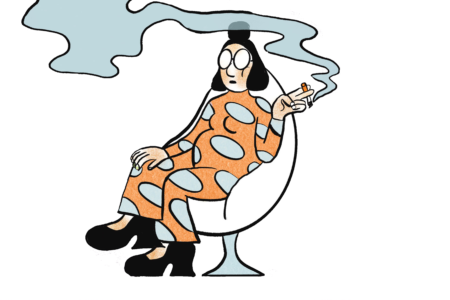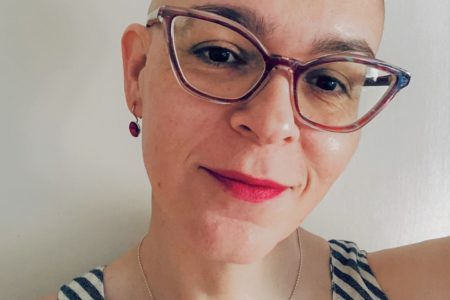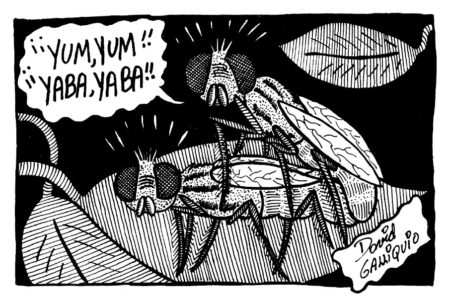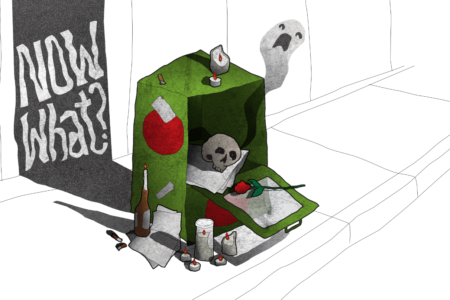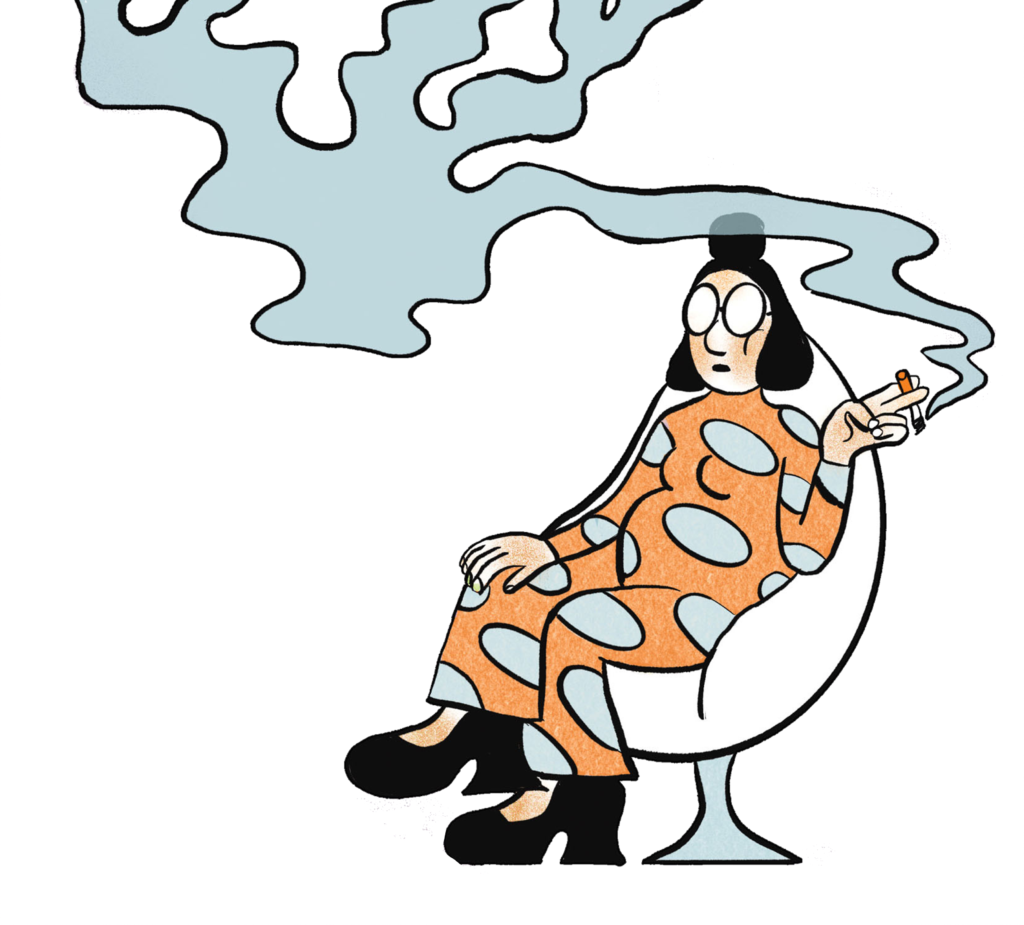 Aisha Franz didn’t set out to write a graphic novel about work. Her previous books—Earthling (2014) and Shit is Real (2016)—explored complex familial, romantic, and platonic relationships through surrealism and science fiction. Her newest, Work-Life Balance, transports her study of human relationships to office buildings and therapy sessions. It satirizes tech and wellness culture, fol-lowing three characters (Anita, Rex, and Sandra) with messy lives as they search for meaning and happiness.
Aisha Franz didn’t set out to write a graphic novel about work. Her previous books—Earthling (2014) and Shit is Real (2016)—explored complex familial, romantic, and platonic relationships through surrealism and science fiction. Her newest, Work-Life Balance, transports her study of human relationships to office buildings and therapy sessions. It satirizes tech and wellness culture, fol-lowing three characters (Anita, Rex, and Sandra) with messy lives as they search for meaning and happiness.
“I find it so odd,” Aisha told me on a Zoom call. “I was telling this story about thirty-somethings, a generation of middle-class white people in the city. That’s why I thought this was a good scenario to give to them, it’s so exaggerated, absurd in itself.”
The phrase ‘work-life balance’ was only recently introduced into the Berliner lexicon, according to Franz. Berlin, long known for its ‘poor but sexy’ cool, was a natural place for tech locusts to swarm after cities like Seattle, San Francisco and Austin got old hat. Aware that being a tech hub often led to skyrocketing rents, homelessness, and widespread gentrification in a city known for affordability Berliners fought back. Residents protested Google’s 2018 proposed Kreuzberg cam-pus. Google backed off. More recently, the passage of the German Competition Act takes on big tech with some of the strongest legislation in Europe.
Unfortunately, big tech’s influence is still evident in Berlin. The city is now home to more than 600 startups. Modeling themselves after successful American businesses, many tried to import American workplace culture to Berlin. Too many Berliners, Aisha explains, now have personal identities bound up in work and the boundaries between their jobs and “real” lives are no longer clearly delineated. Technology has not only permanently transformed how this generation works, but how they think about work. “An older German man was telling me he’s been working for 30 years at this very small company,” said Aisha. “They decided to do these workshops with coaches and improv theater. Everybody was like, “what the hell is going on?” Work culture here is generally very authoritarian, clear hierarchies, every-body is on their own. You don’t really make friends at work. [They say] you can work more fluidly, you don’t have to come to the office all the time. But that means you’re working all the time technically.”
Video game rooms! Nap pods! Treadmills! The job perks in Work-life Balance, though parody, sound almost plausible—levitated water and smiley-face slippers. Another corporate tactic involved appropriating terms like ‘family’ to describe their workforce, implying that every employee was deeply valued. The firm in Work-Life Balance is named Agileal, a play on buzzwords like “egalitarian” and “agile.” Employers were no longer superiors, but ‘friends’ and ‘family’ you could trust. The office of the future, companies promised us, would be inclusive, flexible, and laid-back.
Years later, it’s obvious that the purpose of making work environments more like home was to persuade employees to never leave. And a business is only a family if you agree that families should fire their members without warning. The reality is that as soon as profits are down, Meta and Twitter don’t hesitate to lay off thousands of long-time workers, a situation Rex finds himself in at the beginning of Work-life Balance. His boss, Manuel, couches the bad news in coded expressions like: “we won’t be moving forward.” The absurdity grows as Rex responds with rage while Manuel stands firm in his complimentary smiley-face slippers, maintaining an eerily upbeat demeanour and proclaiming his friendship for someone who openly despises him. It’s painfully clear to the reader that Rex misjudged the depth of Manuel and Agileal’s responsibility towards him, and now he must suffer.
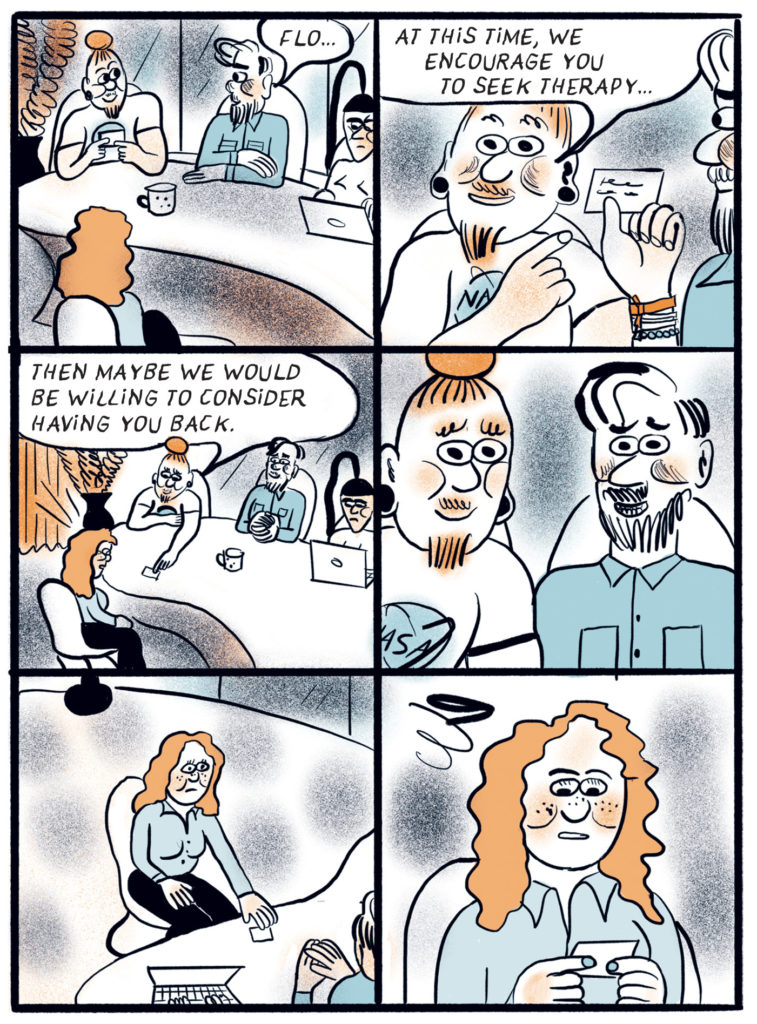 The job loss and resulting identity crisis lead to Rex hacking his way onto an online therapy platform where he meets Dr. Sharifi. She is, to put it mildly, a bad therapist. Dressed in a polka-dotted pantsuit reminiscent of Yayoi Kusama, she munches on chips and applies hand cream while patients bare their souls. Dr. Sharifi functions like the alien character in Earthling. Their stagnancy forces the other characters to react and “create the motion.”
The job loss and resulting identity crisis lead to Rex hacking his way onto an online therapy platform where he meets Dr. Sharifi. She is, to put it mildly, a bad therapist. Dressed in a polka-dotted pantsuit reminiscent of Yayoi Kusama, she munches on chips and applies hand cream while patients bare their souls. Dr. Sharifi functions like the alien character in Earthling. Their stagnancy forces the other characters to react and “create the motion.”
If you watched Netflix’s Love is Blind, you may recall a scene where a woman begins doing jumping jacks from behind a wall while the man on the other side opens up to her about his parent’s divorce. That’s essentially Dr. Sharifi. Wildly, hilariously unprofessional; quick to give out unprescribed medicine and fails to offer her patients any concrete suggestions or tools to deal with their problems. And yet, Dr. Sharifi does help her patients, if inadvertently.
“I wasn’t trying to criticize or make fun of therapy at all,” said Aisha. “It serves as this magnifying glass for each character. The characters in the book are not really getting any help, but by the act of going to therapy they’re faced with themselves, basically standing in front of a mirror.”
Dr. Sharifi isn’t a villain, but a central locus binding the characters’ stories together, as well as a catalyst for their growth. Aisha’s personal version of Dr. Sharifi is the act of creating comics. She tells me that drawing helps her get in touch with her emotions; she, too, needs a catalyst. Although she works outside the tech sector and based many of the stories in Work-Life Balance on anecdotes from friends, Aisha faces similar dilemmas in her own career about identity, work, money, and intellectual property. She supplements the money from comics by taking on commissions for illustrations and other part-time jobs. As for achieving that mysterious thing called work-life balance, she attributes her coherent sense of structure to having a child. Parenthood requires her to divide her time between working in her studio, then completely stopping work in order to be fully present with her daughter. Recently, I was in D.C. getting coffee with my partner on a rare warm, sunny Saturday. We grabbed the only available seats around under a wooden structure that exhorted us to cowork using their free wifi. Even in the midst of hard-won leisure time, we were forcibly reminded of labour. I couldn’t help but think of Work-Life Balance as we sipped our coffees, surrounded by this persistent capitalist idea that every part of our lives, even leisure, should be monetized and used to maximize productivity.
Aisha’s story reminds us that even when tech companies’ exploitation of their workers is framed with cutesy language, it is still exploitation, still harmful. When we fight the urge to constantly be working, we get closer to creating healthy and sustainable models of life. Work-life Balance asks us to try and do just that: ignore the coworking sign, and stay out in the sun a little longer
Arielle Burgdorf is a writer, translator, and PhD candidate at UCSC, where they study queer and feminist translation and experimental writing from Québec. Their chapbook, “I am an Unhappy Male Painter” was published in 2022 by Greying Ghost Press.

